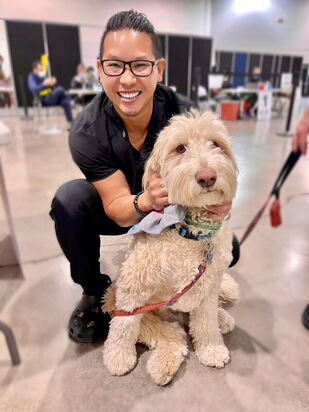|
Let me just emphasize that everything in this blog is solely based on my own personal experience during the worst surges of Covid-19. As you will read, it has never been the same experience or rules every time I took a contract, so I’m sure a lot of travelers who have also worked rapid crisis contracts will have completely different experiences. With that being said, enjoy! Like many other travelers out there, I’m sure you have been curious about the insanely high pay rates that rapid crisis contracts offer, but were not sure on what it all entailed. Here's a little insight on what to expect. First off let me just start by saying, not just anyone can hack these contracts, there is a chance that you will get thrown into literal HELL. However, if you’re lucky, it could be the easiest money you’ve ever made! Here are some of the facts about these assignments. Getting in can be quite the process since you continuously call a hotline and listen to the same automated voice a million times until you finally get through. With luck on your side, this could be within only 10 minutes or a couple hours. On the other hand, you could be calling multiple days in a row that may even lead to weeks without a shred of hope. That will all be just random chance. However, once you do get through, you just need to provide some basic information, then they disclose the location you need to be at by 10 pm the following day. You will be purchasing your own flight (or drive if convenient) and the company will reimburse you $250 each way. Make sure to have your own black scrubs beforehand. Sometimes the hospital that you end up at will offer scrubs when you get to the floor, but you still will need to have your own since you have to show up in the lobby of your hotel to check in with your black scrubs on. You will also receive an email with instructions on which hotel to be at, who your onsite rep is, and other first day instructions. Once you land, you will be responsible for providing your own transportation from the airport to the hotel. You may or may not be reimbursed for this along with the travel reimbursement of $250. Hotel My rapid crisis company provided a hotel. There have been instances, like during hurricane reliefs, where you could be placed in a shelter, but this is on a rare occasion. It is also rare that they will place you in shared rooms, but I won’t say it has never happened. If you are in a hotel, the quality will always vary. Sometimes you can hit the jackpot and have a full kitchen. Other times you’d be lucky to have a microwave or a mini fridge. Some hotels might have washer and dryers on site, others you might have to send out for dry cleaning. You might even get amenities like a gym or a pool. Pretty much just understand that nothing is guaranteed and sometimes it’s all based on availability, but they do try to get you in a decent hotel. Also, don’t try to understand the rhyme or reason to why they do what they do, you’ll never figure it out. Food My company provided a stipend of $50/day. Now I don’t know if this was location based or a company wide policy but if a hospital provides you with food, your company may take away that stipend. I have been on an assignment where we did not receive a stipend since the hospital supplied 1 meal for us during our shift. On the other hand, I’ve had a hospital supply breakfast and lunch but we still got our stipend. Now when I say supply, that means they have separated meal boxes they give to you for free (most of this was when businesses were donating tons of food to hospitals during the pandemic). If you do get a stipend and no meals supplied, you could either purchase meals from the hospital cafeterias or stock up at a grocery store with food if your room is accommodating. I’ve used an online meal prep service and that seemed to be the most convenient if you didn’t want to eat hospital food every day or buy crock pots and Instapots to cook in your room. Some of these hotels also may provide continental breakfasts with real eggs and not the powdered stuff! Time Usually the commitments to these contracts are either 2 weeks or 1 month minimum and after that, you can stay as long as you’d like if the hospital still has needs. So even if you are thrown into a very bad situation, 2 weeks isn’t terrible. 1 month might be a different story. If you choose to leave before the required minimum, you just risk never working with that company ever again. The agencies may be understanding and still let you come back, if you haven’t already been traumatized, if you’ve been thrown in THE WORST situation possible where conditions were just completely unsafe. I believe now you’re only required to work 6 days in a row with 1 day off, but certain locations will allow you to work 7 days straight if you’re brave enough. You will get paid for about 13-14 hours a day. That depends if your rep allows you to document the time you get on and off the bus or only when you clock in and out of the hospital. There is also that chance that you arrive at the site they needed you, work for 3 days, and then suddenly the hospital no longer needs you. At that point, your agency may transfer you to another site if there are needs and you want to be transferred, you may be “staged”, or you can go back home. You are guaranteed 60 hours in those situations. The option to choose shifts also depends on the hospital needs. If they’re drowning all around, you can most definitely choose which shift you want to work. If the hospital is already well staffed, you will work whichever shift they want you to. Your one day off will be up to you, sometimes. However, they will not let you change it week to week. You get one and it stays on repeat like when Justin Bieber’s song Baby first came out back in forever ago. Hospital Like every other travel assignment, this is another gamble. You could be deployed at a very nice hospital with all the necessary resources or you could be knee deep in a donkey’s rear without arms. You could be in a 10 bed hospital with 8 nurses and every patient is a walkie-talkie(imagine doing that for 6 months) or you could be taking 6 patients, all on hi-flo or bipaps, all isolations, and all blood sugars… without a PCT(imagine doing that for 1 month…). It just depends on which part of the deployment you arrive at your assigned hospital. The earlier you get there, the less staff that has been supplied. As the weeks go by and agencies supply more staff, the floods subside and you can finally breathe. At that point, you might only have 2-3 patients, too many PCTs fiddling their thumbs, and a bunch of nurses playing cards. Unfortunately, there’s no way of telling where you’re going and in which part of the deployment until you get through without an option. Sidenote, you may be able to get tons of hotel points depending on the hotel you get. Hilton points baby!!! Rules Your Reps are available 24/7 and should be able to address any issues or concerns you may have during your stay. They will enforce the rules and regulations however they please. Alcohol consumption is ABSOLUTELY prohibited on these assignments so do not be tempted to bring it up through some side door or pay a stranger to carry it in for you to avoid suspicion. Some Reps will say you’re not allowed to leave the hotel and you must have everything delivered to you. You may or may not be able to use the amenities that your hotel offers. Some might not even allow you to have visitors in your room but luckily, most of the ones I’ve worked with have all been really chill. One decided to treat everyone like 5-year-old children and we did not take well to that. We had a new Rep by the end of the week. Side note, some rapid crisis companies do not provide health insurance. Get your own private insurance or risk it for that biscuit. If you do happen to get Covid while you are working, you will have to quarantine in your room where you will not get paid except your meal stipend. You may arrive at your hotel only to realize that they are not ready for you to start working at the hospital right away for whatever reason. If that is the case, you will be put on standby or what they call “staged”. This is probably the worst thing you could expect when agreeing to sell your soul away. When you are staged, you will not work at all and remain in your hotel until they sort everything out. HOWEVER, you will still be paid for 12 hours. This will only be the hourly rate even if you’re going into overtime (I believe this is the new policy). They still expect you to come down at 7 (am and pm) to sign in and out every day as if you worked your shift. Do not get too comfortable with chillaxing. The hospital and agencies are working very diligently to find where to place you so I would absolutely not try to finish 20 different Netflix series, learn 2 different languages, and master 10 new hobbies. Transportation My agency supplied shuttles to and from the hotel and hospital. Even if you have your car with you, you need to use the shuttle bus to go to work. You cannot Uber to work. They typically have you sign in and out on the bus if you’re actually working. For anything else, you’re fine to use your own mode of transport. If you have really cool bus drivers, sometimes they’ll do grocery store runs for you a couple times a week. If not, UberEats or GrubHub it is. I have heard of some locations renting out vans for you to share with a few other people to get to the hospitals. I think that just depends on how many staff members need to go to that hospital. Majority of the time, the agencies will try to set you up in hotels close to the hospital you’re assigned to. With that being said, there have been rare instances where nurses were being shuttled 1-2 hours to hospitals or shelters to work and then back. Yes, they were paid for those transport hours but I’m sure it still sucked. Overall, I have mixed feelings about my experiences. On one hand, I have constant flashbacks and trauma from what I saw, but on the other hand I grew as a person/nurse and now have a good amount of savings. No one knows how long these contracts are going to last. My advice is if you are flexible, mentally stable, resilient and confident in your clinical skills go for it! Written by Keven Hoang, Travel Nurse
0 Comments
Leave a Reply. |
Archives
October 2023
|


 RSS Feed
RSS Feed


